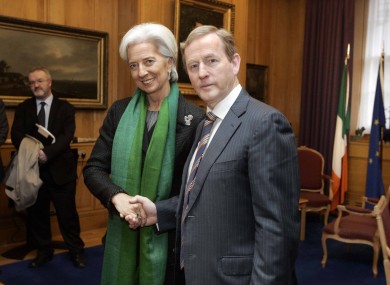If one recognises water as a basic human right - a concept endorsed last year by the United nations, then the decision to allow it be taken out of public control and given to private interests is reprehensible, writes Frank Groome.
The recent government decision to introduce household water meters and charges, as mandated by the terms of the EU-IMF bailout, is the second crucial step towards the full privatisation of water services and resources in the country. The first step was taken almost a year ago at a United Nations General Assembly vote on a resolution recognising the human right to water – a vote on which the last Irish government abstained.
In this historic vote, the United Nations declared “the right to safe and clean drinking water and sanitation as a human right that is essential for the full enjoyment of the right to life." The resolution was passed with 122 nations in favour, none against and 41 abstentions. It is interesting to note that most of the abstaining countries - which included a majority of developed countries - argued that the resolution would impose expensive obligations on wealthier countries to meet the provisions in the resolution and could undermine a process in the UN's Human Rights Council in Geneva to build a consensus on water rights - a multilateral process that many commentators argue is unlikely to produce an outcome anytime soon.
On the face of it, this explanation of the vote might appear somewhat reasonable; however, a cursory examination of the events preceding the UN vote reveals a more telling motive. The recent resolution at the UN was introduced by Bolivia, a country that has extensive frontline experience in defending public ownership of water resources and services. Indeed, Bolivia is probably the best-known example of the grassroots global resistance to water privatisation. In 1999, the World Bank recommended the full privatisation of Cochabamba’s water supply company and even threatened to withhold $600 million in international debt relief if the Bolivian government refused. Not long after the government took the decision to privatise water, bills started rising - ultimately reaching almost twenty dollars a month (in a city where the minimum wage - at the time - was around a hundred dollars a month). Eventually through massive grassroots mobilisation and mass strikes this perverse decision was reversed - but not before a number of citizens were killed during the street protests.
The Dark Experience of Privatisation
This dark experience with water privatisation has encouraged successive Bolivian governments to continue the push for the UN to recognise water as a human right; a position not recognised in the 1948 United Nations Declaration of Human Rights, but a position most governments -especially most established democracies - would be hard pressed to explain to their electorate if they openly refused to recognise it. However, in the diplomatic negotiations that preceded last year’s vote, it was clear that most of those UN members that abstained
would have voted in favour had the resolution explicitly recognised “access” to water as a human right. The reason: governments would be able to continue their efforts to hollow out core government services and privatise water. After all, governments would only be required to provide citizens with “access” to water - which they would achieve through private companies offering water services to households - but governments would have no obligation to ensure citizens could afford to pay for water. It is also telling to discover that many of those abstaining countries have already or have plans underway to privatise water.
Dec 2014 Former Junior Minister Fergus O’Dowd, one the people involved in setting up Irish Water, said he felt that there were “forces at work” with “agendas” to privatise the utility company. He said he remains “deeply concerned at other agendas, they may be European… I don’t know where they are coming from…” and said we have “real reason to be concerned” about the possibility of Irish Water being privatised.
Responding to the Fine Gael TD’s comments, Environment Minister Alan Kelly told reporters this morning: “ I don’t really know what Fergus O’Dowd is talking about, to be frank. I haven’t a clue. thejournal.ie
Pressure of the IMF in Ireland
The pressure from the International Monetary Fund and World Bank to replace public (collective) ownership of water services with corporate control in Ireland is being realised by the government’s recent decision to introduce water meters, and ultimately charges, for usage. However, the legal imprimatur to proceed with this decision was based on the decision of the previous government to abstain from recognising water as a human right.
The lasting importance of this decision to abstain on the UN vote is significant. It represents the acquiescence of a hollow government to the fanatical principles of a neoliberal capitalism that aims to commodify everything, without regard to the consequence or outcome on citizens.
The lasting importance of this decision to abstain on the UN vote is significant. It represents the acquiescence of a hollow government to the fanatical principles of a neoliberal capitalism that aims to commodify everything, without regard to the consequence or outcome on citizens.
International Monetary Fund chief Christine Lagarde meeting Taoiseach Enda Kenny, Government Buildings, Dublin. May 2013 journal.ie



